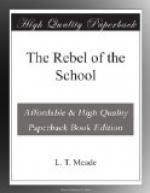“I can’t possibly fail Kathleen,” she said to herself. “She started this splendid idea in order to help me and give me pleasure. I must be at the quarry whatever happens to-night. Something very unusual is detaining mother. I know what I’ll do: I’ll shut up the shop at half-past eight, leave a little note for mother, and then go to the quarry as fast as I can. I will tell mother that I am due at an important meeting, and she is sure not to question me; mother is always very kind, and gives me as much liberty as she can.”
Susy made a great struggle to keep her mind centered on her books, but with all her efforts her thoughts would wander. They wandered to Kathleen and the Wild Irish Girls’ Society; they wandered to her other schoolfellows; they wandered to the hardship of having to take care of the shop when she wished to be otherwise employed; and finally they settled themselves on Ruth Craven. She could not help wondering what Ruth would do—whether she would continue to be a valuable aid to the queen of the new society, or whether she would give them up altogether.
“I’d almost like her not to stay with us,” thought Susy; “for then perhaps Kathleen would make me her Prime Minister. I’d like that. Kathleen is the dearest, truest, greatest lady I ever came across. She doesn’t think anything of birth, nor of those sort of tiresome distinctions; she thinks of you for what you are worth yourself. And she is so splendid to look at, and has such a gallant sort of way. I do admire her just!”
The shop-bell rang. Susy was out in a moment. A woman had called for a penn’orth of paper and an envelope. She put down her penny on the counter, and Susy supplied her from a special box.
“I was in such a taking,” said the woman. “I just remembered at the last moment that all the shops were shut. I don’t know what I should have done if I hadn’t recalled that Mrs. Hopkins kept hers open until nine o’clock. I am obliged to you, little girl. I have to send this letter to my son in India, and I’d miss the mail if it wasn’t posted to-night. You couldn’t now, I suppose, oblige me with a stamp.”
“Of course I can,” said Susy, cheerfully. “Mother always keeps a supply of stamps in the till.”
She turned to the till as she spoke, and for the first time noticed that the drawer was open.
“How careless of me not to have shut it!” she thought.
It did not occur to her to examine its contents, or to suppose for a single moment that any one had taken money out of it. She provided the woman with a stamp, and then, shut the drawer of the till. It was now half-past eight, and Susy determined to take the bull by the horns and to close the shop without further ado. She sent for the little maid in the kitchen to put up the shutters, and in a minute or two the shop was in darkness and Susy was racing through the remainder of her lessons. It would take her a quarter of an hour, running most of the way, to reach the old quarry, and she must have three or four minutes to dress. She stood up, therefore, at her work, in order, as she expressed it, to save time. She was so occupied when her mother came in.




